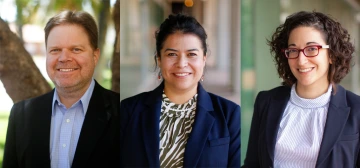Libraries announce Mellon grant recipients to launch U.S.-Mexico Borderlands digital storytelling projects and new collaborations

Bird's eye view of Nogales, Arizona, and Nogales, Sonora border, undated. University Libraries, Special Collections.
People who live and work on the U.S.-Mexico borderlands will be able to see more perspectives of their history, culture and experiences thanks to a grant project created by the University Libraries to support the development of research projects that contribute to a broader understanding of the region.
The Andrew W. Mellon Foundation funded the three-year $750,000 Digital Borderlands project in which the Libraries disburse grants to support the integration of library services into data-intensive, humanities-focused research on the U.S.-Mexico Borderlands.
The first cohort of grant recipients was recently announced.

“The number and the high quality of proposals we received give us great confidence that our vision for the project will be realized,” said Shan Sutton, dean of University Libraries and principal investigator for the Mellon grant. “By facilitating new borderlands research through deep collaborations with a variety of library services and providing open access to the resulting research output, we’re helping ensure accessibility on a global scale.”
The proposals were open to all University of Arizona faculty, submitted in March, and peer reviewed. Four proposals that bridge several disciplines and topics received a $60,000 grant.
“One important component of our project is to make this research available to the communities they represent,” said Verónica Reyes-Escudero, head of Special Collections and one of the co-principal investigators. “It’s crucial that our library collections and services fully represent the people who we serve, and this effort works to correct the lack of representation historically.”
The Libraries are committed to supporting the significant research at the university that is being done in the U.S.-Mexico Borderlands.
“We are working to share these projects with the broadest possible audience,” said Megan Finn Senseney, head of the Libraries' Office of Digital Innovation & Stewardship and co-principal investigator. “The library is involved at every step, whether it’s working with our collections, helping create new resources and knowledge, or developing strategies for communicating project outcomes to different groups.”
The four grant recipients include:
Nicole Antebi, assistant professor, School of Art
“The Rarámuri Dressmakers of Chihuahua City: A Documentary” features the Rarámuri people, an Indigenous people of northern Mexico. The documentary will narrate the ways in which Rarámuri women uphold their sharing economy and identity through dressmaking during a food crisis caused by prolonged drought and growers taking over their farmland to plant marijuana and poppies, most of which are bound for a U.S. market. Antebi's collaborators include writer Victoria Blanco and filmmaker Irene Baqué.
Anita Huizar-Hernández, associate professor, Department of Spanish and Portuguese
”DETAINED Voices from the Migrant Incarceration System” will document the experiences of former asylum seekers and undocumented migrants who were incarcerated by immigration authorities in Arizona. The multilingual written, visual and audio materials created and collected will create an archive that functions as a counter-memorial and tangible record of testimonials. Huizar-Hernández's collaborators include English professor Susan Briante, art professor David Taylor, writer Francisco Cantú, and Daniel Hernandez and Greer Millard of the Florence Immigrant & Refugee Rights Project.
Katherine Morrissey, associate professor, Department of History
Celeste González de Bustamante, professor, School of Journalism
“Reporting on Race and Ethnicity in the Borderlands (1882-1924): A Data-Driven Digital Storytelling Hub” will create an online platform of bilingual primary resources that includes historic newspapers representing the central borderlands communities of Tucson, Arizona, and Ambos, Nogales, and the eastern borderlands communities of Douglas and Bisbee, Arizona, Agua Prieta, Sonora, and Naco, Sonora. Morrisey and González de Bustamante will work on the project with Huizar-Hernández.
Robin Reineke, assistant research social scientist in the Southwest Center; affiliate faculty, Latin American Studies
“Forensic Citizenship in the Borderlands” is a visual and oral history project that will document, analyze and share the stories of civilian forensic expertise on both sides of the Arizona-Sonora border through an interactive website and involve collaborating with two community organizations: Madres Buscadoras and the Colibrí Center for Human Rights. The other project team members are Natalia Mendoza Rockwell of Fordham College and visual artist Miguel Fernández de Castro.
“This grant encourages partnerships among different disciplines at the university, the Libraries, nonprofit advocacy organizations and the communities that are at the center of the most pressing issues impacting the borderlands today,” said Huizar-Hernández, principal investigator for one of the projects.
The second call for proposals for the Digital Borderlands project is expected to be in November.
